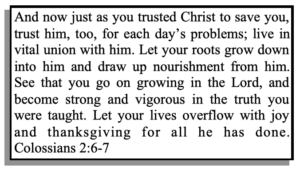Have we raised a generation that has lost the ability to say: “thank you”? Is this an absurd question? Are we simply negligent in recognizing the value of being thankful? Or, perhaps, this is an extreme feeling difficult to voice. Like saying “I love you” or “I’m sorry” perhaps most people find it difficult to form the words. Take a look at Paul’s encouraging directive to the church at Philippi.
“Do all things without complaining and disputing,” Philippians 2:14 NKJV
And he added this:
“Rejoice in the Lord always. Again I will say, rejoice! And the peace of God, which surpasses all understanding, will guard your hearts and minds through Christ Jesus. Whatever things are true, whatever things are noble, whatever things are just, whatever things are pure, whatever things are lovely, whatever things are of good report, if there is any virtue and if there is anything praiseworthy—meditate on these things.” Philippians 4:4, 7-8 NKJV
 Admittedly, angry thoughts and words have led to splintered families, churches, and nations. Without self-awareness those who support such outrage fail to connect the dots; they do not discover that their anger has consequences. They do not understand that at the beginning of every war or divorce or separation there are “words” intended to hurt and accuse. And there is a notable absence of gratitude for the good things that have been a part of each of these relations.
Admittedly, angry thoughts and words have led to splintered families, churches, and nations. Without self-awareness those who support such outrage fail to connect the dots; they do not discover that their anger has consequences. They do not understand that at the beginning of every war or divorce or separation there are “words” intended to hurt and accuse. And there is a notable absence of gratitude for the good things that have been a part of each of these relations.
The antonym of gratitude is not regret or sorrow. It is an angry, bitter, hateful spirit. And this spirit thrives on the notion of entitlement. Entitlement means you owe me something I need. And since want and need no longer are distinguishable, it is unreasonable and unfair to deny me what I want. On this logic all the outrage is justified. In this environment a little gratitude might go a long way to bring feuding factions to the bargaining table.
 It seems incredulous to assume all this because of a lack of gratitude, but that is exactly what we are postulating. Being thankful for the simple benefits of life is devoid of rage, complaining, grumbling, yelling out, “unfair”! These are two feelings that cannot thrive together in the same heart.
It seems incredulous to assume all this because of a lack of gratitude, but that is exactly what we are postulating. Being thankful for the simple benefits of life is devoid of rage, complaining, grumbling, yelling out, “unfair”! These are two feelings that cannot thrive together in the same heart.
wisely observed, “Fairness is not something to which we are entitled. Rather, it is something for which we hope.”
Paul recognizing this went further to say that being grateful, especially in prayer toward God, leads to peace on many levels. It is a peace that soothes our anxious spirits; it is also a peace that mends relations and unites us. The power of a “thank you” spoken honestly, spoken spontaneously, from a heart overflowing with gratitude, can heal a nation if enough people mean it.

